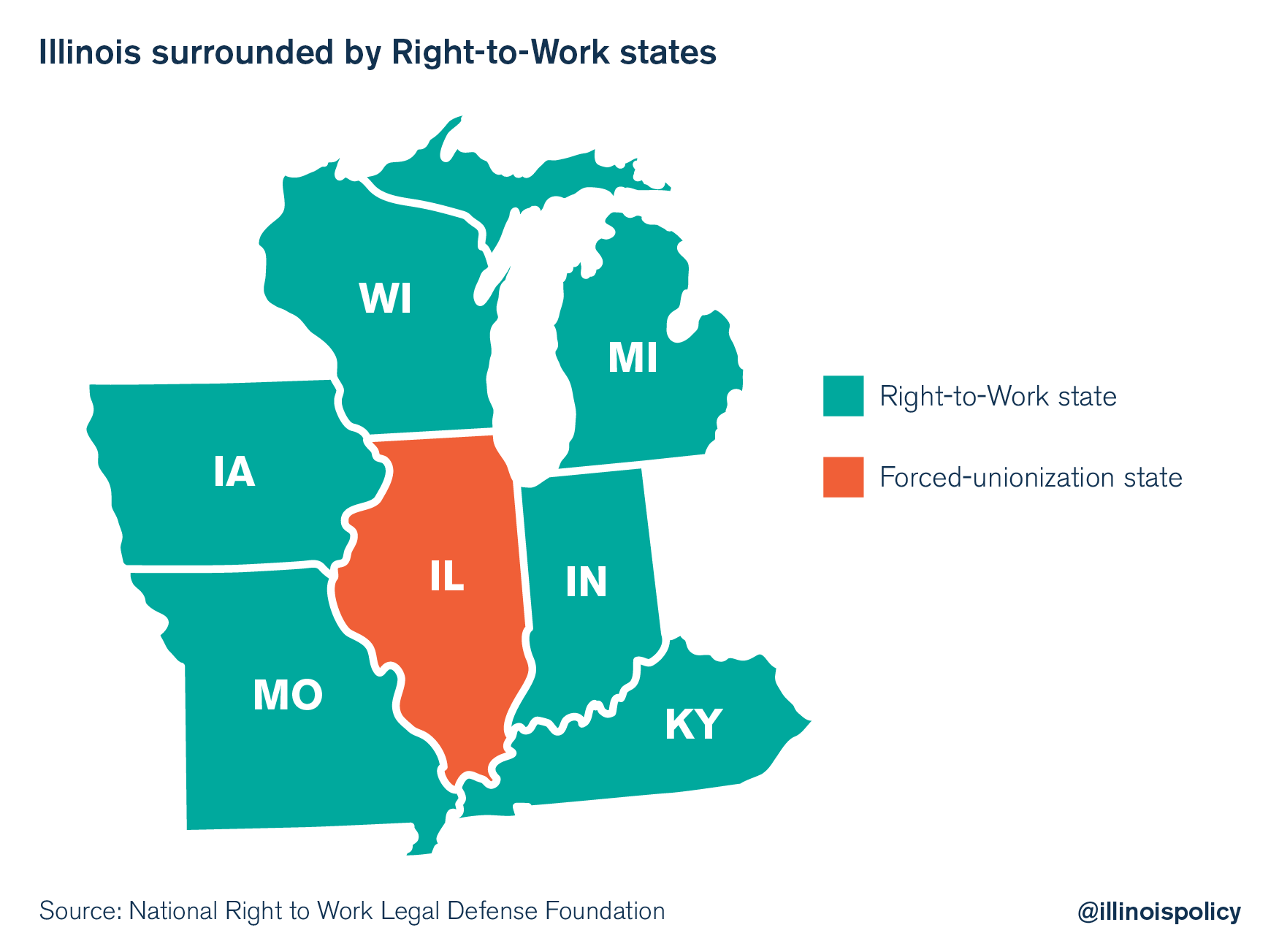Illinois Senate bill intended to kill local worker freedom laws in Illinois
The Illinois Senate has passed a bill to overturn municipal Right-to-Work ordinances and prevent Illinois localities from expanding worker freedom in their communities.
Right to Work gives workers freedom not to pay fees to a union they don’t support. This means that in Right-to-Work states, workers can’t be fired for choosing not to join or pay money to a union.
In Illinois, if a collective bargaining agreement at a unionized workplace requires workers to pay fees to the union to keep their jobs, they must do so – except in the village of Lincolnshire, which voted Dec. 14, 2015, to become the first Illinois municipality to protect worker freedom by enacting a local Right-to-Work ordinance.
But the Illinois Senate passed a bill on April 27 that is intended to quash local Right to Work in Illinois. Senate Bill 1905, introduced by state Sen. Ira Silverstein, D-Chicago, would create the “Collective Bargaining Freedom Act,” which would prohibit local governments in Illinois from passing or enforcing local Right-to-Work measures. Having passed the Senate, the bill is now in the Illinois House of Representatives.
Under SB 1905, the General Assembly reserves for itself alone the “authority to enact any legislation” that by design or in practice “prohibits, … tends to restrict, or regulates in any manner” the use of so-called “union security agreements” between an employer and a labor union. The bill further bars local governments from “enact[ing] or enforc[ing] any local law” that “prohibits, … tends to restrict, or regulates” the use of such union security agreements. “Union security agreements” are collective bargaining agreements that require employees to pay fees to a union as a condition of obtaining or keeping their jobs. Under these agreements, even employees who decline to join the union have to pay a so-called “agency fee” to the union.
SB 1905 is designed to bring Lincolnshire’s ordinance – and potential worker freedom measures in other municipalities – to an abrupt end. This would make Illinois even less competitive for jobs and economic growth, especially compared with neighboring states, all of which have enacted Right to Work.
Local Right to Work in Illinois
Right-to-Work laws allow workers in unionized workplaces to choose whether to support the union. They don’t prohibit unions from existing or representing workers; they just prevent workers from being forced to join or pay money to a union to keep their jobs.
Twenty-eight states – including all of Illinois’ neighbors – have statewide Right to Work. Illinois does not have a statewide Right-to-Work law, but this policy has been adopted at the municipal level by the Lincolnshire Village Board. Lincolnshire passed Right to Work under the village’s home rule authority in December 2015.
Soon after Lincolnshire passed its ordinance, though, unions sued the village in federal court, arguing that federal law only allows Right-to-Work laws to be enacted on a statewide basis, not locally. The trial court agreed with the unions, and the case is now before the U.S. Court of Appeals for the 7th Circuit. The U.S. Court of Appeals for the 6th Circuit, the only other federal appeals court to address this issue, ruled in 2016 that federal law does not prohibit local Right-to-Work laws.
Lincolnshire is waiting for the courts to resolve the matter before enforcing its Right-to-Work ordinance. If the courts uphold Lincolnshire’s measure, other local governments in Illinois would likely consider passing Right-to-Work ordinances to bolster the competitiveness of their communities for jobs and businesses.
Forced unionization puts Illinois at a disadvantage for jobs, encourages out-migration
SB 1905 could broaden forced unionization in Illinois. This isn’t fair to individual workers, and it creates a less friendly jobs climate for the state as a whole.
Over the last 25 years, Right-to-Work states have had double the jobs growth rate of forced-unionization states like Illinois. Illinois has the worst jobs growth in the region, and since February, when Missouri became the 28th state to enact statewide Right to Work, the Land of Lincoln has been surrounded by Right-to-Work states with better jobs climates.

Although Iowa has had a Right-to-Work law since 1947, Right to Work started taking hold across the region in 2012, when then-Gov. Mitch Daniels signed Right to Work into law for Indiana. Michigan followed suit in 2013, followed by Wisconsin (2015), Kentucky (2017) and Missouri (2017).
Since 2012, states across the region have increased competition for middle-class jobs and industrial investment; Illinois, despite having the worst jobs growth in the region, has made no improvements to its industrial regulations. And this has hit manufacturing especially hard. Since July 2012, Illinois has lost 16,700 manufacturing jobs, while Indiana has added 44,100. During this time, Michigan has added 65,800 manufacturing jobs; Wisconsin has added 11,500; Kentucky has added 27,000; and Missouri has added 10,100 production jobs. Iowa had a slight drop of 200 manufacturing jobs over this period.
Not only has Illinois’ forced unionization corresponded with the state’s lackluster economic performance, but it has not even succeeded at bolstering union membership. The Bureau of Labor Statistics recently released a report on union membership by state. The report showed that in 2016, union membership fell by 35,000 in Illinois, compared with increases of 21,000 in Indiana, 3,000 in Kentucky, and 32,000 in Missouri. While union membership is declining in many places – Michigan’s union membership decreased by 15,000; Wisconsin’s fell by 4,000; and Iowa’s dropped by 9,000 over the past year – Illinois’ experience shows that private sector unions are especially unlikely to grow amid weak industrial investment and diminished demand for labor.
Evidence suggests that companies consider the Right-to-Work status of states when deciding on industrial expansions: Two-thirds of global chief financial officers surveyed by CNBC said a Right-to-Work law is either “important” or “very important” when they decide where to grow their businesses. This puts Illinois workers at a severe disadvantage for attracting job-creating investments. Over 1,100 businesses have black-listed Illinois because it is not a Right-to-Work state, according to Jim Schultz, the former director of the Illinois Department of Commerce and Economic Opportunity.
Further stalling Illinois’ jobs growth with anti-competitive legislation such as SB 1905 could also increase out-migration of Illinois residents to other states with better opportunities and friendlier jobs climates. Illinois already has the worst out-migration crisis in the nation, and the biggest cohort of people leaving Illinois for other states is working-age adults.
Illinois doesn’t just lose residents to states with sunnier weather. Illinois loses residents to states in its own backyard, and SB 1905’s loud anti-growth message could spur still more residents and businesses to flee to Illinois’ Right-to-Work neighbors. Between 2006 and 2015, the Land of Lincoln lost: over 13,000 people on net to Kentucky, nearly 73,000 people on net to Missouri, almost 120,000 people on net to Indiana, close to 86,000 people on net to Wisconsin, and nearly 48,000 people on net to Iowa. Moreover, Michigan has now reversed the migration flow between itself and Illinois, causing Illinois to lose over 4,000 people on net to the Wolverine State between 2014 and 2015.
State politicians should not try to strip localities of the right to implement worker freedom policies and improve their economies
SB 1905 is intended to kill Lincolnshire’s ordinance and any would-be Right-to-Work municipalities’ efforts to attract more businesses, foster greater jobs growth, and promote genuine worker freedom for their residents. In addition to undermining localities’ initiatives to enhance economic opportunity in their communities, this legislation is the last thing a state with lagging jobs growth should do. It broadcasts to businesses unions’ grip on the state, and deters job creation and investment in Illinois. Rather than smothering local worker freedom efforts, the General Assembly should give all Illinoisans the right to decide whether to pay money to a union.
